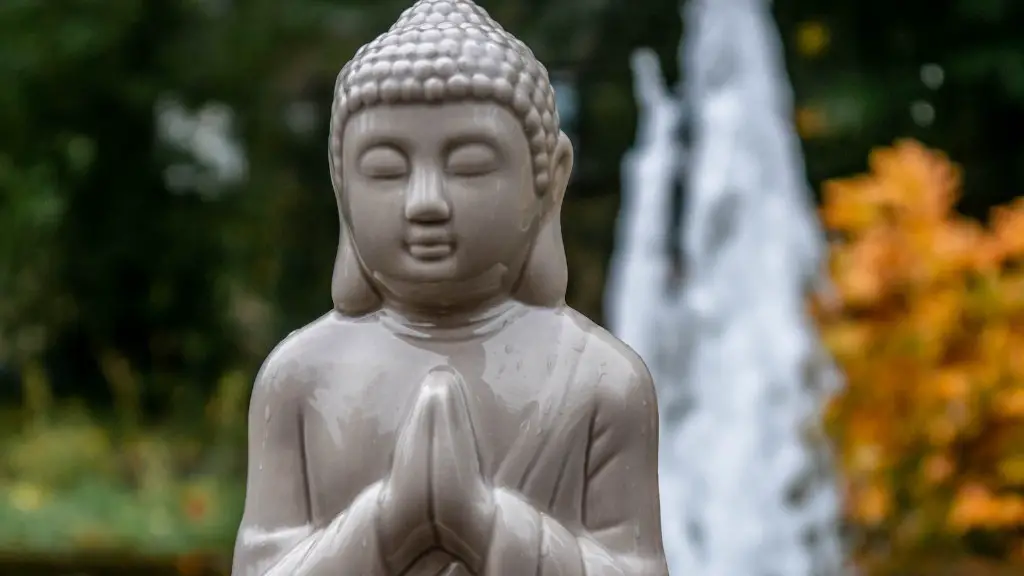Buddhism is an Eastern religion founded in the 5th century BC by Siddhartha Gautama, known as the Buddha. The Buddha taught that we are all born with the potential to achieve Enlightenment, or perfect wisdom and compassion. However, this potential is obscured by the desires and fears that arise in the mind, causing us to suffer. The Buddha’s teachings show us the way out of this suffering and offer the promise of liberation.
The basic teachings of Buddhism are the Four Noble Truths and the Eightfold Path. The Four Noble Truths are that life is suffering, suffering is caused by desire, suffering can be ended by eliminating desire, and the way to eliminate desire is through the Eightfold Path. The Eightfold Path is right understanding, right thought, right speech, right action, right livelihood, right effort, right mindfulness, and right concentration.
What are the main teachings of Buddhism?
The Buddha’s teachings are all about helping people to end their suffering. The Three Universal Truths explain that everything is impermanent, that everything is connected, and that there is no such thing as a permanent self. The Four Noble Truths teach that suffering exists, that it has a cause, that it can be ended, and that there is a path to follow to end it. The Noble Eightfold Path shows the way to end suffering.
Buddhism is a religion that is based on the teachings of Siddhartha Gautama. The main principles of this belief system are karma, rebirth, and impermanence.
Karma is the belief that your actions in this life will determine your circumstances in future lives. rebirth is the belief that you will be reborn into another body after you die, and impermanence is the belief that everything is temporary and will eventually come to an end.
What are the 5 main values of Buddhism
Buddhists believe that people should try to end suffering; all things should be seen as having no self or essential nature. The main Buddhist values are love, wisdom, goodness, calmness and self-control. Buddhists believe in reincarnation, and that the actions of a person in one life will affect their future lives.
1. The Four Noble Truths:
The Four Noble Truths are the cornerstone of Buddhist teaching. They are:
1) suffering exists;
2) suffering arises from attachment to things that are impermanent;
3) suffering can be ended by letting go of attachment; and
4) there is a path to follow that leads to the end of suffering.
2. The Eightfold Path:
The Eightfold Path is the fourth of the Four Noble Truths. It is the path that leads to the end of suffering. The eight steps of the path are:
1) right understanding;
2) right thought;
3) right speech;
4) right action;
5) right livelihood;
6) right effort;
7) right mindfulness; and
8) right concentration.
3. The Three Universal Truths:
The Three Universal Truths are:
1) everything is impermanent;
2) everything is interconnected; and
3) everything is in a state of flux.
4. The Five Aggregates:
The Five Aggregates are the five elements that make
What is the most important rule in Buddhism?
It is important to abstain from taking life because it is morally wrong to do so. It is also important to realize that taking life is not something that should be taken lightly. It is a very serious matter and should be done with great care and thought.
The Buddha’s quote reminds us that we should be careful not to hurt others with the things that bother us. This is known as the Golden Rule, and it is a good moral principle to live by. By following this rule, we can make sure that we treat others the way we would want to be treated.
What are the 7 rules of Buddhism?
1. Clear Viewpoint: Don’t just believe anything just because you saw it or you heard it. Try to develop a clear understanding of things before you believe in them.
2. Values: We end up digging a hole so deep that it is hard for us to find a way back home. So, it is important to have a set of values that guide our actions.
3. Words that Inspire: Actions in Positive Direction. Try to use words that inspire you to take positive actions.
4. Efforts with Impact: Be mindful of the impact of your actions. Make sure that your efforts are having a positive impact on the world around you.
5. Concentrate Right: It is important to focus your attention on the right things in order to be successful. Make sure you are concentrating on the things that are most important to you.
6. Be Patient: Sometimes good things take time. Be patient and don’t give up on your goals.
7. Be grateful: Be thankful for the good things in your life. Gratitude will help you attract more positive things into your life.
The first precept in Buddhism is the prohibition of killing, both humans and animals. This precept is based on the belief that all life is sacred and should be respected. Scholars have interpreted Buddhist texts about the precepts as an opposition to and prohibition of capital punishment, suicide, abortion and euthanasia.
What is Buddhism vs Christianity
Christianity is a monotheistic religion that relies on a God as a creator, while Buddhism is a non-theistic religion that does not believe in a creator God. Although both religions have different beliefs, they both have similar philosophies regarding human nature and the afterlife.
Buddhism advocates for a conscious and respectful approach to eating. All food is prepared as a spiritual exercise with attention to balance, harmony, and delicacy. It is believed that eating with mindfulness can help reduce negative emotions and encourage positive states of mind. Furthermore, Buddhists are advised to avoid eating meat from certain animals out of self-respect and protection. These animals include humans, elephants, horses, dogs, snakes, lions, tigers, boars, and hyenas. By following these guidelines, Buddhists hope to reduce suffering for both themselves and for the animals.
Do Buddhists have commandments?
Buddhist morality is based on the 10 precepts, which are guidelines for how to live a moral and ethical life. These precepts include abstaining from taking life, taking what is not given, and committing sexual misconduct. By following these precepts, Buddhists believe that they can live a life that is in harmony with others and with the natural world.
The Buddha taught that the path to liberation from suffering is the Noble Eightfold Path, which consists of right view, right resolve, right speech, right action, right livelihood, right effort, right mindfulness, and right concentration. Carus has drawn from several of the Buddha’s sermons and other sources to assemble what could be considered the “Ten Commandments” of Buddhism.
Some of these include:
1. Do not kill
2. Do not steal
3. Do not lust
4. Do not bear false witness
5. Do not get drunk
6. Do not gamble
7. Do not wear bird feathers or animals skins
8. Do not eat at the wrong time
9. Do not adorn yourselves with flowers, perfume, or jewelry
10. Do not sleep on high or broad beds
What is sin in Buddhism
Buddhism does not believe in any personal God or any Supreme Being. Therefore, the word “pāpa, apuñña” or sin stands for the evil elements that defile the mind and have a deadening effect on the psyche making it difficult for its upliftment.
The Dharma Wheel is the most important symbol of Buddhism. It represents the Buddha’s teachings of the Four Noble Truths and the Eightfold Path. The eight spokes of the wheel represent the Eightfold Path. The Dharma Wheel is also a reminder that we should always be striving to learn more and to live our lives in accordance with the Buddha’s teachings.
What religion believes in karma?
The concept of karma is the belief that our actions determine our future, and that good actions will lead to good outcomes while bad actions will lead to bad outcomes. This belief is closely associated with the idea of rebirth, which is the belief that after we die, our soul is reborn into another body. This cycle of birth and death continues until we reach nirvana, or enlightenment.
The Four Noble Truths are the foundation of Buddha’s teachings. They provide a framework for understanding the causes of suffering and the ways to end it. While they leave much left unexplained, they offer a powerful and concise guide to the path of liberation.
Conclusion
The basic teachings of Buddhism can be summarised in the Four Noble Truths:
1. Life is suffering (dukkha)
2. Suffering is caused by craving (tanha)
3. Suffering can be ended by letting go of craving
4. There is a path to the end of suffering, which is the Noble Eightfold Path.
The four noble truths are the basic teachings of Buddhism. The first truth is that life is suffering. The second truth is that suffering is caused by attachment and craving. The third truth is that suffering can be ended by letting go of attachment and craving. The fourth truth is that the way to let go of attachment and craving is through the Eightfold Path.




